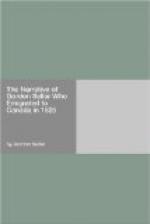The ship made a good voyage and in time he got to Toronto, where, with some trouble, he was given a location-ticket for a lot. Bargaining with a teamster who was taking a load to a settlement in the neighborhood of his lot, to leave his chest on his way, he started on foot. It was well he did, for from what he saw on the road he learnt much of what settlers have to do. He watched the chopping of trees, the making of potash, the hoeing in of the first crop, and the building of shanties, for in succession he came upon settlers engaged in all these operations, and he was not backward in asking questions, or slow in observing. The afternoon of the second day he reached where the local land-agent lived. There was a small gristmill, a sawmill, a blacksmith shop, an ashery and half a dozen houses, all rudely built, planted in a surrounding of stumps, with the bush encircling all. Asking at the largest shanty for Mr Magarth, the woman he spoke to pointed to a man, bareheaded and in his shirtsleeves, piling boards. On hearing his business Magarth said, ’You’re the man whose chest was left here yesterday. Well, it is too late in the day to show you what lot you have been given. Can you count?’ On being told he could, Magarth got a shingle and a piece of chalk and told him to mark down as he called out the measurements of the boards. On finishing the pile, Archie reported the number of feet. ’Just what I guessed,’ said Magarth, ‘now come with me.’ He led to the door of an extension at the end of his house, which Archie saw was a primitive shop, there being, in a confused heap, everything settlers could call for. Explaining his daughter who kept his books was on a visit to Toronto, he handed Archie an account-book and asked him to write down the entries




